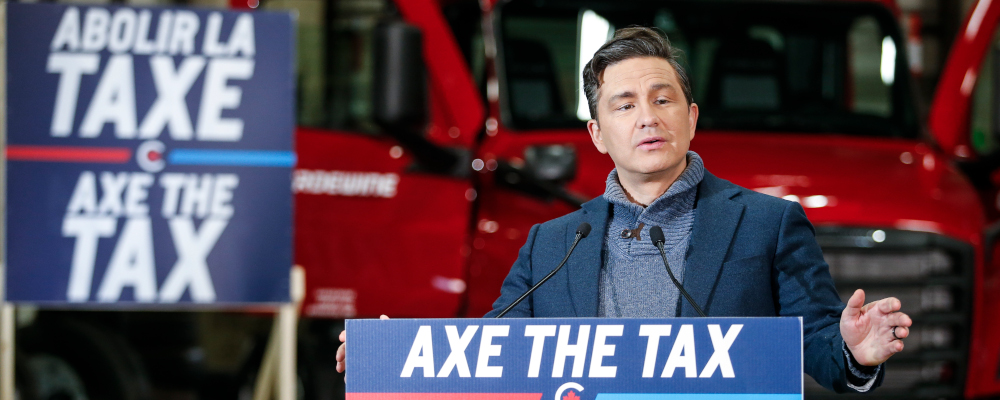This week’s Conservative Strong and Free Networking Conference will feature Pierre Poilievre giving a keynote speech on Thursday morning before a gathering of conservative activists, thinkers, politicians, and party members from across Canada. It represents the perfect opportunity for Poilievre to emphatically hammer one of the key issues fueling his remarkable rise and the Conservative Party’s resurgence: affordability.
Affordability is currently Poilievre’s greatest political advantage and Justin Trudeau’s most glaring weakness. But it shouldn’t be understood as merely a transitory issue. Addressing the country’s arduous cost of living—particularly for working-class Canadians—will be one of the country’s key policy challenges over the coming decade. It therefore represents an opportunity for Poilievre not just to become prime minister, but to reforge his party’s coalition to include working-class voters, for a generation.
Anglo-American politics have been marked for the past decade or longer by what’s sometimes referred to as a “realignment” along the lines of educational polarization. In effect, we’re seeing university or college-educated professionals move to the political Left and non-university or college-educated members of the working class move to the Right. This trend is exemplified by Donald Trump’s surprise victory in the 2016 U.S. presidential election—including in states like Michigan, Ohio, and Wisconsin—as well as the British Conservative Party’s breach of the so-called “red wall” in Northern England in the country’s 2019 elections.

There’s plenty of evidence that Canada has experienced similar political developments over the several election cycles, dating back arguably to the Reform Party and today’s Conservative Party. In the 2021 federal election, Conservative leader Erin O’Toole attempted to hasten these trends to extend the party’s reach to working-class Canadians including with policy proposals such as mandated worker representation on corporate boards.
Yet it’s been Poilievre’s disciplined focus on affordability that’s bringing a lot of working-class members into the Conservative fold. Polling for instance shows that the Poilievre-led Conservatives now outperform the other parties with members of private-sector trade unions.
The Conservatives’ success in reaching a broad coalition of voters—including the working class—conjures images of Tony Blair’s landslide victory in the 1997 British election. In that campaign, the Blair-led Labour Party’s signature campaign slogan was “Things can only get better!”, which was ripped from an early 1990s radio hit that served as the campaign theme song. The song included the memorable lines:
…and do you feel scared? I do! But I won’t stop and falter! And if we throw it all away, things can only get better…
It would be a fitting soundtrack to Poilievre’s 2025 election campaign if Blair had not famously co-opted it almost 30 years ago. It is difficult to imagine things getting much worse as far as affordability goes in Canada.
The Trudeau government’s supporters or foreign columnists can trot out all the favourable statistics they like, but Canadians remember recent and happier times. They would prefer a future that resembled the more normal past, instead of the end of the month when many renters will fork over an average of $1,922 to not be evicted from their one-bedroom apartment.
Certainly, not all of Canada’s unaffordability issues began with Trudeau or his government. But their inability to help fix everyday problems for working and middle-class Canadians is a failure they have to own. There’s compelling evidence in particular the government’s high spending and high immigration rates have contributed to the inflationary environment in which Canadians now find themselves.
Herein lies the opportunity for Poilievre: the affordability crisis has clearly been key to his political ascendancy, one that has included expanding the Conservative Party’s voter coalition to include working-class voters.
The 2015 federal election proved that the Conservatives have a rock-solid traditional base in Western Canada that all but guarantees them a shot of winning any given election. However, adding youthful, working-class, and swing voters to their voting pool could deliver a Conservative supermajority that has not been elected since the 1980s.

Conservative parties in Canada have a history of grand coalitions that have often delivered enormous majorities, only for them to implode and usher in a generation of Liberal governments. Sir Robert Borden’s 1917 majority absorbed the pro-conscription wing of the Liberals, only for it to fall apart in 1921, ushering in nearly continuous Liberal governments until 1957.
In 1984, Brian Mulroney delivered another large majority with the votes of alienated Westerners and nationalist Quebecers. That coalition fell apart as well and ushered in another 13 years of Liberal governments.
It’s a powerful reminder that the Conservative Party’s relationship with prospective working-class voters cannot be merely transactional. Britain, again, highlights that politicians cannot take the realignment for granted, given that the Conservative Party is poised to suffer a major electoral defeat, in part because the working-class members who voted for it in 2019 are now abandoning the party. Put differently: political trends in Britain confirm that working-class voters behave like any other swing voters who punish incumbents who fail to improve their quality of life.
Poilievre’s speech last month in Vancouver signaled that he understands the opportunities and risks here. His line that his “daily obsession will be about what is good for the working-class people in this country” is a sign that he’s determined to avoid the fate of his British brethren.
The key question will be how these speeches and comments come to manifest themselves in a pro-working-class policy agenda. Frankly, Canadians of all stripes will need to feel their quality of life improve over a government’s term in office, including in their monthly paycheques, rent, and mortgage payments. Phone bills will have to come down, and $70 worth of groceries should result in more fully stuffed grocery bags, hopefully in reliable and thin plastic ones.
Given the rampant affordability concerns currently capturing Canadian attention, the government that oversees those improvements will win the loyalty of a generation, regardless of class.




